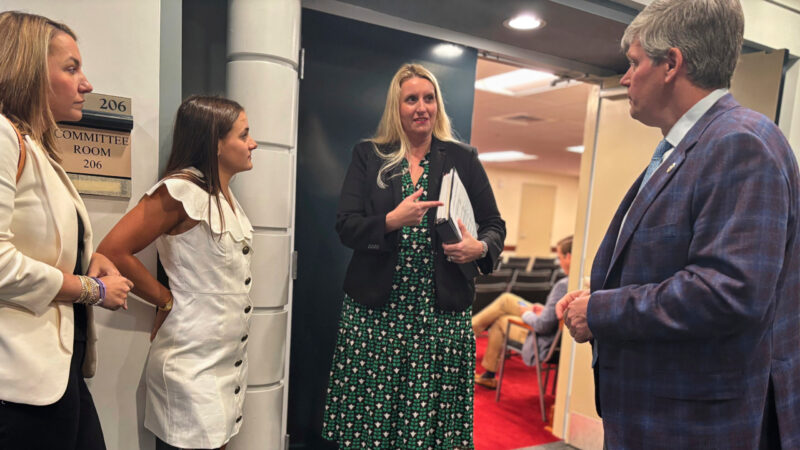Shark attack survivor presses Alabama for an alert system to keep people safe in the water
Lulu Gribbin, second from left, an Alabama teenager who survived a shark attack in 2024, speaks with attorney Charlanna Skaggs, second from right, and Alabama lawmaker Rep. David Faulkner, right, at the Alabama Statehouse in Montgomery, Ala., Wednesday, April 9, 2025.
MONTGOMERY, Ala. (AP) — An Alabama teen who narrowly survived a fierce shark attack last year said she hopes a proposed alert system before state lawmakers can help keep others safe in the water.
Lulu Gribbin, now 16, was one of three people bitten by a shark on June 7, 2024, during a string of attacks off the Florida Panhandle. She lost her left hand and a portion of her leg. On Wednesday, she asked Alabama lawmakers to support a proposed shark attack alert system.
The bill by Republican Rep. David Faulkner would establish an alert system, similar to the Amber Alert system, that would issue a notice to the public when there’s been an unprovoked shark attack in the vicinity.
“Ninety minutes before me, there was another shark attack a couple miles down the coast,” Gribbin said. Had she known about that attack, she and her friend would not have ventured into the water that day, she said. “This bill will help prevent future attacks and accidents.”
The Alabama House Public Safety and Homeland Security Committee advanced the bill Wednesday. It now moves to the full Alabama House of Representatives. The first of it’s kind system
Gribbin and her friend had been diving for sand dollars before the attack. They were riding the waves back to the beach when her friend screamed, “shark!”
“I saw a big shadow, but we all just started swimming for our lives,” She recalled. She said she tried to remain calm, remembering that sharks were supposed to be attracted to frantic motion. Then the shark attacked her and her friend.
“My hand was bitten first. I remember just lifting it out of the water, and I was stunned because there was no hand there. I couldn’t feel it because of all the shock I was in. Then the shark latched onto my leg,” she recalled.
A man she describes as a hero ran to pull her from the water. She blacked out and came to on the shore where a doctor and other medical workers, who were on the beach that day, rushed to save her. “I remember being focused just to keep my eyes open and to breathe, to just be able to make it to the hospital,” she said.
Her lengthy recovery has been documented on social media. As she visited the Alabama Statehouse, people frequently stopped to ask for photographs and to tell her that her story has been an inspiration.
While sharks are commonly found in the waters off Alabama and Florida, shark attacks are rare, said Gavin Naylor, director of the Florida Museum of Natural History’s shark research program. He said there are between 50 and 90 unprovoked bites around the world each year. And a trio of bites in a single day in close proximity is extremely rare, he said.
He said, generally speaking, the data shows that one shark bite does not increase the likelihood of another happening soon. However, Naylor said weather conditions that day likely brought an abundance of small fish closer to shore.
“The bait fish were very close into shore along that same beach and sharks were following them. But on any day in Alabama, you can see 20 or 30 bull sharks 400 meters offshore, but they just don’t interact with the public because they are much farther away,” Naylor said.
Naylor noted that rip currents kill far more people than sharks each year. Four people were killed worldwide in shark attacks last year. The U.S. Lifesaving Association estimated there are about 100 deaths each year in the U.S. from rip currents.
While the proposal would only impact the Alabama coast, Faulkner hopes other states will pursue similar systems or that federal legislation would expand its use.
“There had been a shark attack just down the beach, and yet she had no notice. And I felt like in this day and age, that’s something we shouldn’t let happen,” Faulkner said.
The bill, which would name the alert system for Gribbin, was changed to issue an alert only when an unprovoked attack occurred off the coast.
An earlier version would have allowed an alert for an “imminent danger” from sharks. There were concerns from beach communities that language was too vague and could lead to an excessive alerts, causing panic and potentially hurting the tourism industry.
Alabama Gov. Kay Ivey on Wednesday urged lawmakers to approve the legislation, saying it will be an “added tool” to keep people safe, calling the teen “an inspiration and an awesome example of courage.”
In Berlin, there are movies, there’s politics and there’s talk about it all
Buzz around whether the city's film festival would take a stance on the war in Gaza has dominated conversation in recent days.
Alex Ferreira wins 10th gold medal for Team USA, matching America’s highest total in Winter Olympics
Freeskier Alex Ferreira clinches a tenth gold medal for the U.S. in these Games, tying the U.S.'s all-time record for gold medals in a Winter Olympics.
Trump calls SCOTUS tariffs decision ‘deeply disappointing’ and lays out path forward
President Trump claimed the justices opposing his position were acting because of partisanship, though three of those ruling against his tariffs were appointed by Republican presidents.
The U.S. men’s hockey team to face Slovakia for a spot in an Olympic gold medal match
After an overtime nailbiter in the quarterfinals, the Americans return to the ice Friday in Milan to face the upstart Slovakia for a chance to play Canada in Sunday's Olympic gold medal game.
NASA eyes March 6 to launch 4 astronauts to the moon on Artemis II mission
The four astronauts heading to the moon for the lunar fly-by are the first humans to venture there since 1972. The ten-day mission will travel more than 600,000 miles.
Skis? Check. Poles? Check. Knitting needles? Naturally
A number of Olympic athletes have turned to knitting during the heat of the Games, including Ben Ogden, who this week became the most decorated American male Olympic cross-country skier.








